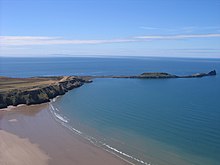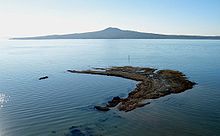Tidal island: Difference between revisions
Content deleted Content added
m →United Kingdom: 'Holy Island' already listed as 'Lindisfarne' |
No edit summary |
||
| Line 7: | Line 7: | ||
[[File:Cramond Island and causeway from air.JPG|thumb|250px|[[Cramond Island]], [[Scotland]], at high tide: the causeway is submerged, but the anti-boat pylons are still visible]] |
[[File:Cramond Island and causeway from air.JPG|thumb|250px|[[Cramond Island]], [[Scotland]], at high tide: the causeway is submerged, but the anti-boat pylons are still visible]] |
||
A '''tidal island''' is a raised area of land within a [[waterbody]], which is connected to the larger mainland by a natural [[isthmus]] or man-made [[causeway]] that is exposed at low [[tide]] and submerged at high tide, causing the land to switch between being a [[promontory]]/[[peninsula]] and an [[island]] depending on tidal conditions. |
A '''tidal island''' is a raised area of land within a [[body of water|waterbody]], which is connected to the larger mainland by a natural [[isthmus]] or man-made [[causeway]] that is exposed at low [[tide]] and submerged at high tide, causing the land to switch between being a [[promontory]]/[[peninsula]] and an [[island]] depending on tidal conditions. |
||
Because of the mystique surrounding tidal islands, many of them have been sites of [[place of worship|religious worship]], such as [[Mont-Saint-Michel]] with its [[Order of Saint Benedict|Benedictine]] [[Abbey]]. Tidal islands are also commonly the sites of [[fortification|fortresses]] because of the natural barrier created by the tidal [[channel (geography)|channel]]. |
Because of the mystique surrounding tidal islands, many of them have been sites of [[place of worship|religious worship]], such as [[Mont-Saint-Michel]] with its [[Order of Saint Benedict|Benedictine]] [[Abbey]]. Tidal islands are also commonly the sites of [[fortification|fortresses]] because of the natural barrier created by the tidal [[channel (geography)|channel]]. |
||
Revision as of 15:02, 19 April 2024
This article needs additional citations for verification. (October 2023) |



A tidal island is a raised area of land within a waterbody, which is connected to the larger mainland by a natural isthmus or man-made causeway that is exposed at low tide and submerged at high tide, causing the land to switch between being a promontory/peninsula and an island depending on tidal conditions.
Because of the mystique surrounding tidal islands, many of them have been sites of religious worship, such as Mont-Saint-Michel with its Benedictine Abbey. Tidal islands are also commonly the sites of fortresses because of the natural barrier created by the tidal channel.
List of tidal islands
Asia
Hong Kong
- Ma Shi Chau in Tai Po District, northeastern New Territories, within the Tolo Harbour
- Kiu Tau Island in Sai Kung
Iran
- Naaz islands in Persian gulf, southern seashore of Qeshm island
Japan
Taiwan
- Kueibishan in Penghu
- Jiangong Islet in Kinmen
South Korea
- Jindo Island and Modo Island in southwest South Korea
- Jebudo in the west
Europe
Denmark
- Mandø Island – on Denmark's western coast
- Knudshoved Island – north of Vordingborg on southern Zealand, Denmark
Denmark/Germany
- The Halligen in the North Frisian Islands, Denmark/Germany
France

- Île Aganton in Brittany
- Île Madame in Charente-Maritime
- Île de Noirmoutier in Vendée
- Mont Saint-Michel in Normandy
- Tombelaine in Normandy
Germany
- The Neuwerk in the Wadden Sea
Guernsey
- Lihou in Guernsey, one of the Channel Islands
Iceland
Grótta in Seltjarnarnes, the Capital Region
Ireland
- Coney Island near Rosses Point, County Sligo
- Omey Island in Connemara, County Galway
- Inishkeel, County Donegal
Italy
- Isola Grande, Sicily
Jersey
- Elizabeth Castle in Jersey, a castle off the south coast accessible on foot at low tide
- Saint Aubin's Fort
- La Corbière Lighthouse
- La Motte, Jersey, alias Green Island
- L'Avarison, which hosts Seymour Tower
- Archirondel Tower, now connected via permanent causeway
- Icho Tower
- Portelet Tower
Spain
- Cortegada Island in Pontevedra coast, Galicia.
- San Nikolas Island in Lekeitio, Bizkaia
United Kingdom


England
- Asparagus Island, Mount's Bay, Cornwall
- Burgh Island, Devon
- Burrow Island, Portsmouth Harbour
- Chapel Island, Cumbria
- Chiswick Eyot in the River Thames in London
- Gugh in the Isles of Scilly (joined to St Agnes at low tide)
- Hilbre Island, Middle Eye and Little Eye in the River Dee estuary, between North Wales and the English Wirral, but administratively in England.
- Horsey Island, Essex
- Lindisfarne, Northumberland, also known as Holy Island
- Mersea Island, Essex (accessible to road traffic via the Strood)
- Northey Island, Essex
- Osea Island, Essex
- Piel Island, Cumbria
- Scolt Head Island, Norfolk
- Sheep Island, Cumbria (joined at low tide to Piel Island and to Walney Island)
- St Mary's Island, North Tyneside
- St Michael's Mount, Cornwall
- White Island, Isles of Scilly and St Martin's, Isles of Scilly
Northern Ireland

- Nendrum Monastery on Mahee Island, Strangford Lough
- Guns Island, near Ballyhornan
- Isle of Muck, Portmuck
Scotland
- Baleshare in the Outer Hebrides, joined to North Uist
- Bernera Island, joined to Lismore
- Brough of Birsay in Orkney, joined to Orkney Mainland
- Castle Stalker on Loch Laich in Argyll
- Cramond Island in the Firth of Forth
- Island Davaar near Campbeltown, off the Kintyre peninsula
- Eilean Donan in the western Highlands of Scotland
- Eilean Fladday and Eilean Tigh off the Isle of Raasay
- Eilean Shona in Loch Moidart, Lochaber, Highland
- Eilean Tioram, in Loch Moidart
- Erraid off the Isle of Mull
- Hestan Island near Rough Island in Auchencairn Bay
- Islands of Fleet: Ardwall Isle and Barlocco Isle in Galloway
- Isle Ristol, the innermost of the Summer Isles
- Kili Holm in Orkney, joined to Egilsay
- Oronsay in the Inner Hebrides, joined to Colonsay
- Oronsay in Loch Bracadale, joined to Skye
- Orosay in the Outer Hebrides, joined to Barra
- Rough Island opposite Rockcliffe, Dumfries & Galloway
- Vallay (Bhàlaigh), joined to North Uist in the Outer Hebrides
Wales
- Burry Holms off the Gower
- Cribinau off Anglesey
- Gateholm off the south west coast of Pembrokeshire
- Ynys Llanddwyn off Anglesey
- Mumbles Lighthouse located in Mumbles, near Swansea
- St Catherine's Island in Pembrokeshire
- Sully Island in the Vale of Glamorgan
- Worm's Head at the end of the Gower
- Ynys Cantwr off Ramsey Island, Pembrokeshire
- Ynys Feurig off Anglesey
- Ynys Gifftan in Gwynedd
- Ynys Gwelltog off Ramsey Island, Pembrokeshire
- Ynys Lochtyn on the coast of Cardigan Bay
43 (unbridged) tidal islands can be walked to from the UK mainland.[1]
North America
Canada
- Finisterre Island off of Bowen Island, British Columbia, Canada
- Francis Peninsula off of Sunshine Coast (British Columbia), British Columbia, Canada
- Micou's Island in St. Margarets Bay, Nova Scotia, Canada
- Minister's Island in New Brunswick, Canada
- Ross Island and Cheney Island in Grand Manan, New Brunswick, Canada
- Wedge Island, Nova Scotia, Canada
- Whyte Islet in West Vancouver, British Columbia, Canada
- Bird Islet in Neck Point Park, Nanaimo, British Columbia, Canada
United States

- Bar Island in Maine
- Battery Point Light in California
- Bumpkin Island in Massachusetts
- Camano Island in Puget Sound of Washington state, since earth filled
- Charles Island, in Connecticut
- Douglas Island in Alaska
- High Island, New York
- Long Point Island,[2] Harpswell, Maine
- Tskawahyah Island of Cape Alava, Washington
Oceania
Australia
- The Point Walter Sandbar in Perth, Western Australia has slowly formed into a tidal island and is only connected to the mainland in extreme low tides.
- Penguin Island (Western Australia) in the Shoalwater Islands Marine Park
- Former tidal island Bennelong Island in Sydney, Australia was developed into Bennelong Point and is now the location of the Sydney Opera House.
New Zealand

- Matakana Island in Tauranga Harbour
- Opahekeheke Island in the Kaipara Harbour
- Puddingstone Island in Otago Harbour
- Rabbit Island, Bells Island, and Bests Island in Tasman Bay
- The Hauraki Gulf islands of Motutapu Island and Rangitoto Island are connected at low tide
- The Okatakata Islands in Rangaunu Harbour
See also
References
- ^ Peter Caton (2011). No Boat Required – Exploring Tidal Islands. Troubador Publishing Limited. ISBN 978-1848767-010.
- ^ longpointisland.com Archived 2007-09-27 at the Wayback Machine
External links
 Media related to Tidal islands at Wikimedia Commons
Media related to Tidal islands at Wikimedia Commons


